- Home
- Gavin Chappell
The Archimedes Stratagem
The Archimedes Stratagem Read online
The Games of Hadrian
The Archimedes Stratagem
GAVIN CHAPPELL
Copyright © Gavin Chappell 2018
Cover art by Ethel Ross Barker
All illustrations provided under license from Wikimedia.
All rights reserved. No part of this book may be reproduced or transmitted in any form or by any electronic or mechanical means, including photocopying, recording or by any information retrieval system, without the written permission of the publisher and author, except where permitted by law.
The right of Gavin Chappell to be identified as the author of this work has been asserted by him in accordance with the Copyright, Designs and Patents Act 1988.
Published by Schlock! Publications 2018
ISBN-13: 978-1984297815
ISBN-10: 1984297813
This book is a work of fiction and any similarities to actual persons and/or places are purely coincidental.
Schlock! Publications
www.schlock.co.uk
In the same series:
On Hadrian’s Secret Service
Murder in Hadrian’s Villa
The Hadrian Legacy
Our Man in Alexandria
The Games of Hadrian: The Gladiator Gambit
And by the same author:
Crocodile and Leopard
The Man Who Sold the Roman Empire
Prologue
Library of Alexandria, Egypt, 31st August 124 AD
Shadows hung over the great open space like the cobwebs of vast spiders. Moonlight shone through the skylight, glimmering on the porphyry floor, striking highlights from the colonnade of marble pillars. In the daytime robed scholars walked here, scrolls in hand, or clustered together in small, quietly speaking groups. But at this time of night, silence hung heavy. The shelves towered upwards into the darkness, like the roughhewn monoliths of some barbarian shrine on the far edge of the world. It was more reminiscent of an Egyptian mausoleum than a place of learning.
Outside, the city was silent at last. Most of the night torches had blazed in the streets, illuminating boisterous, roistering crowds of citizens celebrating the eighth anniversary of their liberation. Throughout the day, races had been held, gladiatorial combats fought, sacrifices made, libations poured. But now even the most ardent celebrant sought his bed, and only lonely patrols of civic guards trod the silent streets. In the harbour, boats bobbed at anchor, the great lighthouse shone out to sea the beam of the fire upon its summit. Otherwise it was a city of the dead.
A sudden noise broke the silence of the library, a clatter that sounded and resounded through the vast, echoing space. Voices in the shadows hissed for silence. A hand reached picked up the fallen object. It was a gladiator’s sword.
Silent feet trod upon the marble floor. Four dark figures, wrapped in cloaks, crossed the hazy beam of moonlight, and vanished like a dream into the darkness. A door opened in the wall and they were briefly silhouetted against the light of a terracotta oil lamp. Then the door closed, and all was still and silent again in the Library of Alexandria.
The man with the lamp ushered them into the small, cramped office. Grudgingly he showed the first of his visitors to the chair behind the cluttered desk, while the others squatted down on the cold marble floor after two of them placed a wooden coffer on the floor. The last sat by the door clutching his sword.
‘Is all prepared?’ the man with the lamp asked, sitting on a stool.
His first visitor, who wore the visored helmet of a gladiator, shook his head. ‘No! All is not prepared!’ he said vehemently. ‘Our Delta encampment was overrun by natives who had been suborned by one of the emperor’s agents. My command force was annihilated but for the men you see with me.’ He spoke Latin with the accent of an Iberian, but the man with the lamp was a Greek, an Alexandrian citizen.
The Alexandrian’s expression did not alter, but his voice became a pale ghost. ‘Then all is lost.’ The shadows cast by his lamp wreathed his face. ‘We must give up our plan. We will only plunge the empire into chaos, and although the Greek cities might free themselves during the wars, they will be as divided and defenceless as they were when they fell first to the Macedonians, then the Romans…’
The Iberian shook his head. ‘Our own forces are scattered,’ he said, ‘but they can be gathered again. Messages have been despatched by secret channels, and our warriors will be making their way into tactical positions. What matters most is your own contribution.’
The Alexandrian studied that enigmatic mask of bronze. ‘So you are determined to go ahead with the plan? Very well, all is prepared. You know the test was successful, even if it drew unwanted attention. As Fortune granted it, no one guessed the reason for the fire aboard the ship. No one in this great city, it seems, has read the history of Archimedes. None but I. Those barbarians!’ His eyes narrowed. ‘But the time of the emperor’s arrival remains a mystery.’
‘A mystery,’ the Iberian admitted, ‘but not to all.’
The Alexandrian raised his eyebrows. ‘You know when Hadrian will arrive?’
The Iberian shook his head irritably, and highlights glittered from his visored helmet. ‘Not yet. The knowledge was within my grasp. But then the Bucolics turned traitor and we were forced to flee, abandoning the others to their fate. We had to leave behind the one man who knew what we desperately need to know.’
‘You are telling me that one of your own men knew when the emperor will be arriving,’ the Alexandrian said, ‘and you left him to have his throat slit by a band of river pirates?’
The Iberian shook his head again. ‘He was not one of my men,’ he said, ‘but was a spy, brought to me by the Bucolics as a peace-making gift. Interrogating him I learnt that he was one of the few men in Egypt privy to the knowledge we desperately need. But he was dangerous. He said he knew my own identity, which I have kept a secret from even you. I gave him the chance to fight for his freedom, knowing that after the tortures we had already inflicted he would not survive. But he engineered a double-cross, and the Bucolics who had brought him to the encampment set upon my men. Without the knowledge we need we returned to the city for this meeting …’
‘You left the city because the civic guard had broken up your crime ring,’ the Alexandrian said. ‘Typical Roman, incompetent half barbarian. If I did not have to depend on your help…’
‘But you do,’ said the Iberian smoothly, ignoring the insults. ‘Don’t trouble yourself. All is in order. I have conceived a plan to capture this agent and wring the truth from him. Several plans.’
‘Several plans,’ echoed the Alexandrian. ‘But will any of them work?’
The man clutching the sword gave a growl, and the Alexandrian looked down at him in distaste. ‘It seems I offend your loyal hounds,’ he added wryly. ‘But your blundering has shaken my faith in you. It is only because I need your help to liberate the Greek cities that I remain allied to you.’
The Iberian cackled. ‘For an oriental Greek, you’re as frank as any Germanic barbarian,’ he said. ‘Very well, things went badly in the marshes. It was a mistake to use torture to extract information, the agent was trained to resist. And when I learnt that he knew my identity, I was forced to change my tactics…’
‘You panicked.’
‘Enough! I tried to have him killed. Then the Bucolics proved treacherous. They were working together, the agent and the river pirates. We had to flee. But he will follow us. We will secure the information we need, one way or another.’
‘You’re sure he will follow?’
The Iberian nodded. ‘He’ll follow,’ he said. ‘I made sure of that. I have my agents as well. The gladiatrix will have played her part. And when he returns, he will be walking into a trap.�
�
The Alexandrian pursed his lips. ‘You have known little success in this city,’ he said. ‘What of the civic guard? The prefect’s men?’
The Iberian shook his head. ‘They will be suborned. Or dealt with. We will ensure that the imperial agent falls into our hands. We have other agents in the city who will aid us. He will be captured, interrogated, and killed. Even if he does not truly know my identity, he is still dangerous.’
‘You come here bringing no real news,’ the Alexandrian grumbled. ‘Disaster in the Delta. Your identity revealed to this agent—when even I do not know your real name. And even now we do not know when the emperor will arrive. Will this agent provide that information? Unlikely, unless you can find a way to trick him. Of course, my villa is available for your use if you need somewhere to keep him, but taking him prisoner will be difficult... Who else will know? Someone else in the province must know when the emperor will be making his visit. Someone more tractable than an imperial agent.’
The Iberian shrugged. ‘The prefect. The legate of the Twenty Second. Their confidantes as well, perhaps.’
‘Do you have no one on the prefect’s staff?’
The Iberian gritted his teeth. ‘Haterius Nepos’ men have proved difficult to win over. Nevertheless, I do have a plan to penetrate his councils.’
He produced something from the folds of his clothes and held it up in the lamplight. The Alexandrian peered at it in surprise. He looked up. ‘Where did you obtain this? Is it genuine?’
The Iberian shook his head. ‘No. But convincing enough. I have seen the real one many times. It would convince me. And it will convince the prefect.’
The Alexandrian’s face relaxed. ‘Why did you not make use of this earlier?’ he asked abruptly.
‘I always keep something in reserve,’ the Iberian told him, ‘in case of contingencies. That is how to win in war and in politics.’
The Alexandrian nodded grudgingly. ‘And your forces will be mustered in time to strike as soon as the emperor is dead.’
The Iberian nodded. ‘The moment the emperor ascends to the heavens on a pillar of flame, they will move to seize key positions throughout the province. The legion and the civic guard will both be dealt with. Either they will come over to our side or they will be killed outright. Then Egypt will be ours, and we can starve Rome into submission by blockading the grain supply. The Roman mob will cry out to accept me as emperor.’
‘And when you are,’ the Alexandrian murmured, ‘The Greek cities will be liberated?’
‘Of course,’ the Iberian promised. ‘Wasn’t that the basis of our agreement? You provide the means to kill Hadrian, and in return I fulfil your dream.’ He nodded. ‘Now, you must return to your work just as we will return to ours. Oh, but first—do you have papyrus and a reed pen?’
The Alexandrian rose and rooted among the clutter of the desk. ‘This is the Library of Alexandria, after all,’ he said, providing the Iberian with what he required. ‘Writing materials are scarcely in short supply.’
Resting the papyrus on the desk, the Iberian wrote at length. At last he sealed the letter he had written. ‘Now,’ he said, ‘This will be delivered to the prefect’s office. You will have no other duties until we learn the time of the emperor’s arrival. Once that happens, you know what to do.’
The Alexandrian lifted his eyes to an imaginary horizon. He clenched his fist. ‘Yes,’ he said. ‘I know what to do.’
—1—
Alexandria, Egypt, 1st September 124 AD
As soon as the patrol vessel touched the quay side, the Roman leapt across the gap. He turned to wave a grateful farewell to the centurion in charge and beckoned to his Egyptian companion, still standing on the side staring at the gap anxiously.
‘Thank you, centurion!’ Gaius Flaminius Drusus said. The man he addressed acknowledged his words with a curt salute and went to speak with his men.
The Egyptian looked at the Roman, shut his eyes, and jumped, landing in a tangle of limbs on the slippery cobblestones of the Great Harbour. The Roman grabbed him to steady him and looked around at the bustling scene.
It was morning, and the sun’s rays gleamed from the top of the Pharos lighthouse above a harbour that seethed with life. Crewmen and passengers embarked or disembarked, harbour guards tramped up and down, the brine tanged air was filled with the cries of seabirds and the shouts of sailors. The Egyptian turned in the direction of the Museum, and the Library, just visible over the city walls.
‘When do you think Arctos will hold this meeting?’ the Egyptian asked his Roman companion. ‘Quick as we’ve been, they must have got here ahead of us. If Kalasiris’ people hadn’t been friendly with those patrollers, we’d have taken even longer to get across the Delta.’
‘This is the Calends of September, Ozymandias,’ Flaminius said, leading the Egyptian up the quay side towards the Library. ‘Three more days until the end of the Days of Hadrian[1]. We don’t know when Arctos intends to hold his meeting; for all we know he’s held it already. But he doesn’t know when Hadrian will arrive, and he obviously wants to know.’
Flaminius was still weak from the torture he had received at the hands of the rebel leader and his gladiatorial companions. But he was determined to sound out Arctos’ plot and defeat it.
‘I don’t suppose you want to share that information with me, do you?’ asked Ozymandias, waddling at the Roman’s side. ‘Arctos has some plan to assassinate his imperial majesty when he sails into the harbour. But when is that going to be? Only you seem to know.’
Flaminius grimaced. ‘The prefect knows,’ he said, ‘and so does Avidius Pollio, the legate.’ The latter had only shared the information with Flaminius, his intelligence man. ‘But it goes no further.’
Ozymandias stopped dead in his tracks in the gateway that led into the walled city. ‘Oh, thanks!’ he said bitterly. ‘You don’t trust me? If it hadn’t been for me and my contacts in the Delta, you’d have been dead at Arctos’ hands by now.’
‘I doubt that,’ Flaminius said. ‘You certainly were instrumental, you and the river pirates. But the fewer people privy to sensitive information the better.’ He clapped Ozymandias on one wiry shoulder. ‘Don’t you see? It’s nothing personal. But if they were to take you prisoner, they might be able to get the information out of you. Everyone speaks under torture. I was close to blabbing when they were softening me up. If it hadn’t been for Kalasiris’ people, I might have told Arctos what he wanted to know. So might you, if he got you in his clutches. He’s ruthless, as good as any legion interrogator.’
Ozymandias bit his lip. ‘Very well,’ he said resentfully. They started walking again. ‘I don’t like to think that you don’t trust me, your own agent, but I understand your reasoning. Now I’ve got to face up to my two biggest worries.’
‘What are they?’ Flaminius asked.
‘We’re going to the Library. I’ll have to explain why I didn’t turn up for work.’
Flaminius laughed, and clapped him on the shoulder again. ‘I think we’ve got worse things to worry about,’ he said. ‘I’ll put in a word for you, if it’s really troubling you. What was the other worry?’
‘Explaining my absence to Nitocris.’
Walking on in silence, they began to ascend the Library steps. Ozymandias’ sister-wife had been anxious about his absence when Flaminius last saw her. A sweet girl, she nevertheless had a tongue she could wield like a slave master’s whip when she wanted to.
They entered the Library. All was quiet at this time of the morning; even the Greek scholars who thronged its walkways were absent. Flaminius cast about in the opulent gloom, wondering where to start.
‘All we know is that Arctos was supposed to come here for a meeting,’ Ozymandias said, looking nervously at him. ‘We don’t know what time, or whereabouts.’
‘So let’s go quietly,’ said Flaminius in an undertone. Ozymandias’ words had stirred up echoes in the great space.
Even as the Roman spoke, he heard the sound
of footsteps and people talking. Peering round the nearest set of shelves, he saw two figures stride out of a side door.
‘…was depending upon you to ensure the Library was secure overnight…’ one of them was saying.
‘My apologies,’ the other said. ‘I didn’t know that was my duty… you realise I’m a volunteer…’
Flaminius recognised from his previous visit as the senior librarian. He halted, and gave the other a conciliatory smile. ‘I blame myself,’ he said. ‘I should have ensured that you were fully conversant with your duties. It’s so vexing when reliable staff absent themselves without explanation…’ He broke off, seeing Flaminius and Ozymandias, and his face purpled. He strode forward.
The Egyptian gulped audibly. ‘I’m off,’ he squawked. Flaminius caught him by the collar of his tunic as he tried to run.
‘Don’t be a fool, Ozymandias,’ the Roman hissed. ‘I said I’ll speak up for you and I will.’
‘May I ask what you’re doing here?’ the senior librarian asked in a hostile tone.
‘Oh, I’m sorry,’ said Flaminius affably. ‘Isn’t the Library open yet?’ But the senior librarian was paying him no attention.
‘Usermaatre Setepenre!’ he barked at Ozymandias. This tongue twisting string of syllable was Flaminius’ friend’s name in Demotic Egyptian. ‘Where have you been?’ He gestured at the Greek at his side. ‘If my friend had not come to our aid and filled in for you, we would have been seriously understaffed! You vanished without a word...’ He glanced at Flaminius and halted mid-flow. ‘Oh,’ he said. ‘I remember you. You were the young man who came looking for him. So you found him! My thanks for bringing him back.’ He shook Flaminius’ hand. ‘Well,’ he snapped at Ozymandias. ‘What do you have to say for yourself?’

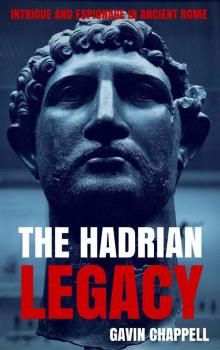 The Hadrian Legacy
The Hadrian Legacy On Hadrian's Secret Service
On Hadrian's Secret Service Murder in Hadrian's Villa
Murder in Hadrian's Villa The Sword of Wayland
The Sword of Wayland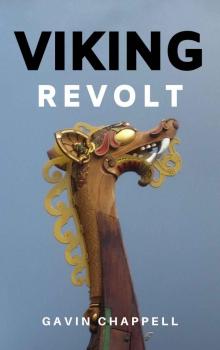 Viking Revolt
Viking Revolt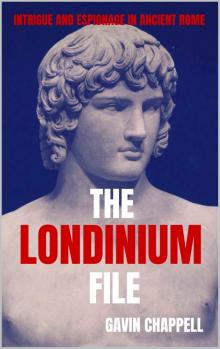 The Londinium File
The Londinium File The Gladiator Gambit
The Gladiator Gambit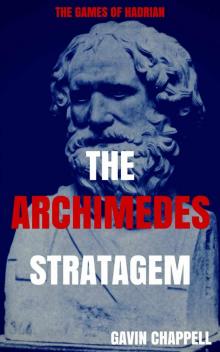 The Archimedes Stratagem
The Archimedes Stratagem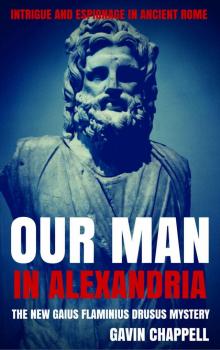 Our Man in Alexandria
Our Man in Alexandria Into the Void (The Dungeoneers)
Into the Void (The Dungeoneers) The Kingdom That Rome Forgot
The Kingdom That Rome Forgot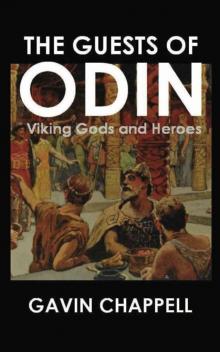 The Guests of Odin
The Guests of Odin